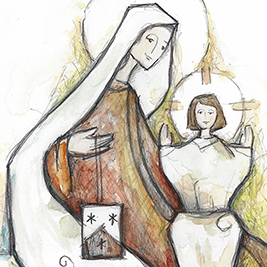Because Carmel means ‘Garden of God’ this novena is entitled “Gardening Tips from the Garden of God.”
Today’s tip: seeds, tiny but mighty.


Fr Greg, Carmelite priest – blog, homilies, fun and holy ideas
Because Carmel means ‘Garden of God’ this novena is entitled “Gardening Tips from the Garden of God.”
Today’s tip: seeds, tiny but mighty.

Because Carmel means ‘Garden of God’ this novena is entitled “Gardening Tips from the Garden of God.”
Today’s tip: watering the garden.

a commentary by Gregory Houck, O.Carm. – Friday, June 5, 2020
We are living in racially-charged times and race has become a ‘front burner’ issue with protests and even rioting throughout the United States in response to the killing of an African-American, George Floyd, by a policeman in Minneapolis; this on the heels of other recent racially-charged events in New York, Georgia and Kentucky. What is the Carmelite response?
First, some history. Spain of the 1500s, after driving out the Moors (Muslims) and the Jews from the land, put in Purity of Blood laws throughout the Spanish empire. Not only did a person had to be a natural-born white European to
but that person had to also show that his/her parents and grandparents also had ‘pure blood.’ This prevented anyone of Jewish, Muslim, or native American ancestry from having any kind of employment, any kind of power or even a family anywhere in Spanish lands.

Yes, those were racially-charged times. In the middle of that Saint Teresa of Avila founded her first reformed Carmelite convent in 1568. She told the sisters that they would not follow the Purity of Blood laws when admitting new members to the Order. Some of those sisters, and much of Spain, were not happy with Teresa. Some accused her of being a lawbreaker or a free-thinker; and some plotted to have her arrested and locked up. She did not flinch – even when the Spanish Inquisition began looking into her policies. This is the Carmelite response – to support any oppressed minority and work against oppression but also to empower and include them fully.

This inclusive policy did not begin with Saint Teresa though. On Mount Carmel in the 1200s the first Carmelites were formed from a mishmash of nationalities and cultures and, yes, races; pushed together onto Mount Carmel by war. In those racially-charged times, those first Carmelites worked through all those issues and all those differences forming one Order and made it work. From its founding and throughout an 800-year history, this is the Carmelite way. Today, we too can work through this and make it work!
Our Lady of Mount Carmel, pray for us!
Carmelite homily for Sunday (Easter VI), May 17, 2020 – Lectionary 55 (John 14:15-21)
In today’s Gospel Jesus says that if you love him, you will keep his commandments; the Father will send the Advocate, the Spirit the world cannot accept. What does all that mean? I think it means – what is our starting point? Do we start with ourselves? Do we start with God? Saint Therese of Lisieux writes, “My thoughts belong to the Holy Spirit; they’re not mine. Without the Spirit of Love we cannot call God our Father.” I think the call is to begin with God; begin with the Holy Spirit. That’s where it all begins with anyway, so let us start there. And we’ll find the Advocate is in our lives. God is with us. The Spirit helps us to call God our Father.

Carmelite homily for Wednesday (Easter V), May 13, 2020 – Lectionary 287 (John 15:1-8)
In today’s Gospel Jesus uses the well-known image of ‘I am the vine; you are the branches; remain on the vine and you will bear great fruit.’ To remain on the vine means to do what the vine does, what Jesus does, which is: forgive seventy times seven, return a blessing for a curse, love your enemies, turn the other cheek, the Golden Rule. This bears a great harvest, a great fruit. Teresa of Avila says, “Let us not cease to believe that even in this life God gives the hundredfold.” I think that’s what Jesus promises in today’s Gospel.
